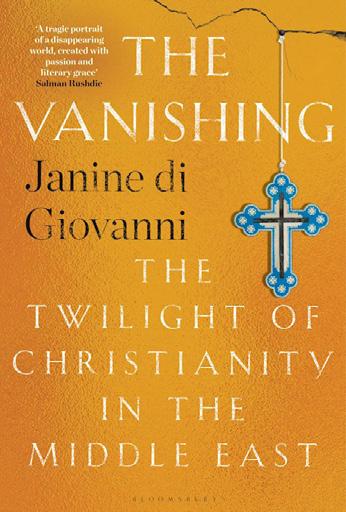
4 minute read
by Fr John Scott
The Twilight of Christianity in the Middle East?

The Vanishing: The Twilight of Christianity in the Middle East; Janine di Giovanni; London 2021, Bloomsbury Publishing; pp xiv + 252; hbk £20; ISBN 978-1-5266-2583- 0
Fr John Scott
di Giovanni has given us a book that is intensely personal whilst seeking to analyse present historical realities within the context of a region formed by the whole history of Christianity and its relationship with Islam. Herself an acclaimed war correspondent, we are taken on a journey to four areas, hearing of people encountered, lost and, sometimes, rediscovered over years which have seen, as she calls it, the twilight of so many Christian communities and consequent increase of exile and migration.
Her foci are Iraq, Gaza, Syria and Egypt, although she begins with her own experience of living under lockdown in Paris. She writes of her Catholic upbringing: ‘the prayers I hated as a child during Lent, when my classmates and I were forced to kneel for hours during Holy Week, passing caustic notes about the nuns or the priests. But these are also the prayers that have sustained me, consoled me and guided me in the many years I have roamed the world to record and document wars’.
She notes that more than 93% of the people in the Middle East identify as Muslim, with much of Iraq’s and Syria’s Christian population close to extinction, Egypt’s Copts facing legal discrimination and fewer than 1,000 Christians left in Gaza, itself entirely Christian in the 4th century. Yet, in all this change: ‘I slept in houses that were not so different from the ones that existed in ancient times – flat square buildings with ladders to the roof, where we would sleep in summer .. In Abraham’s day, men would gather in the courtyards to chat, bargain and gossip, drinking from large urns with straws. In 2002, I saw men very much like their ancestors’.
But how do people survive under great pressure, as in Gaza and its refugee camps? The organist of the Church of the Holy Family explains: ‘We are prisoners here. That’s the best way to put it .. It is difficult for all Christians in Palestine, but Gaza is – well, Gaza is impossible. But we stay. It is my home’. In this land, the birthplace of Christ, Christians refer to themselves as ‘living stones’ referencing I Peter 2:5. So here they continue awkwardly, trapped between feuding political rivals, hopeless for the future of their young people. Fr Mario, the Church’s priest, says of his early years there: ‘I prayed for Gaza to get better every year. But every year it gets worse .. I am saddened to leave, but this year was the hardest of my life. People came to me every day to solve problems and you can’t help everyone. If you give to one, you get everyone upset. These are not bad people. These are desperate people’.
Over in Syria, di Giovanni visits Maaloula and its Sunni Imam: ‘Here in these mountains there are all different people, different religions .. but we decided adamantly that Maaloula would not be destroyed’. But a year later the fighters arrived with Russian rifles, shooting the citizens, silencing the prayers and shattering the unity; ‘the vow the town made would be worth nothing’. The experience there underlines the problem across all these lands; the necessary compromises that were made years ago with authoritarian regimes that allowed Christians at least to stay in their traditional homeland and to enjoy a level of freedom, even protection. In Syria that meant Christian support for and trust in ‘Mr Assad’ – ‘It was a common refrain in Syria, that the country was being used because of its geopolitical significance. It was “foreign forces” that were causing the war, they argued’.
Over in Egypt, Copts face similar problems, choosing between President Sisi and the Muslim Brotherhood. Zakher, a Cairo businessman and Copt, comments that bombing churches and having persecution reported in the media is used as a means of embarrassing the government, showing it to be powerless. But is there any other choice than to support the President? ‘Over the Christmas holidays, the government insisted on wrapping Cairo’s churches in enormous Egyptian flags, as if they were gigantic Christmas presents .. it symbolized a kind of protection, but worshippers saw it as a kind of threat: you are Egyptians first, Christians second.’
It will be clear that The Vanishing will not a cheerful read, but di Giovanni’s ability both in description of circumstances and of individual characters leaves one with a sense of having met our fellow Christians who, in all this adversity, still display how faith and hope can combine to render life possible.










